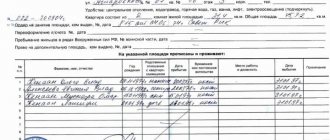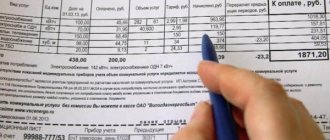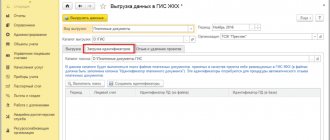Attention!
New residents still continue to be exposed to risks associated with utility bills! Inattention at the stage of re-registration of documents can lead to quite unpleasant consequences that plunge even an inveterate optimist into despondency. Experts recommend that after registering property rights, you should continue your journey through the authorities without delay in order to re-issue agreements on utility payments as soon as possible.
We decided to figure out what could result from ignoring this important issue, and also offer the reader an optimal algorithm of action.
Buying a home is, of course, an important event, and many newly minted property owners, having completed the official registration process, go to celebrate the housewarming and explore the new space, putting aside the rest of the paperwork.
Basic moments
A special financial account is issued for citizens' residential premises. Registration takes place for housing owned by right of ownership, as well as under a social tenancy agreement.
4 information that is indicated in the document:
- residential address,
- footage,
- number of rooms,
- information about amenities: gas pipeline, heating, sewerage, elevator, garbage chute, bathroom.
The number of registered citizens must be specified. After all, the size of payments for utility services depends on their number.
You may also be interested in: Installing a gas meter in an apartment: price.
One invoice is issued for the entire apartment. If housing is owned by several owners, then information about the owners and the size of their shares is specified.
By agreement of the owners, the main owner is determined. The application must be left at the passport office.
When adjustments are made, the basis must be indicated, as well as the employee’s signature and date.
Watch the video: How to connect a personal account in your personal account
Buying a home
Purchasing real estate is a responsible undertaking. Therefore, it is necessary to make sure that the seller has not left any debts on the apartment. To do this, a certificate is requested confirming the absence of debt for utility services.
The statement by financial number shows what accruals were made and payments made.
To reissue a personal number, you must notify the passport office, as well as resource providers, about the changes. If housing is purchased as shared ownership, then each owner must submit an application.
You need to take a certificate stating how many people are registered and contact the unified settlement center. If there are several owners, then each of them is required to give their approval for the re-registration of documentation. Before you buy a home, you need to make sure that the seller actually paid all the receipts. Otherwise, problems will arise for the new owner.
If meters are not installed, then charges are made based on how many resources are actually consumed.
Important! Several institutions will have to be notified. Therefore, you can simplify the task if you make copies of documents in advance. All that remains is to send them to the authorities.
How many accounts can be opened?
Most often, a utility consumer has one account number, which is provided to him by the management company. However, each locality has its own rules. Since services are provided by different organizations, each of them can open their own personal account. Of course, the consumer is responsible to each of these structures for timely payment for services. If new owners install meters in apartments, these devices must be registered with resource suppliers.
It happens that companies are reorganized, change structure and subordination, or even liquidate. In these cases, consumers receive new personal accounts along with appropriate notification. In these cases, the re-conclusion of the contract is initiated by the organization itself.
How to transfer a personal account
From the moment of purchasing a home, the responsibility to pay for housing and communal services passes to the new owner. This rule is established by Art. 153 Housing Code of the Russian Federation.
If utility payments come to the old owner, then you should contact the unit of the Unified Settlement Center.
4 documents to replace the owner:
- contract of sale,
- barter agreement,
- extract from the Unified State Register of Real Estate,
- certificate of ownership.
When an apartment was purchased and the new owner paid utility bills for the previous owner, it is necessary to save these receipts.
It will be useful for you: How to find out the personal account number by address and why it is needed
Debts “by agreement”
Often, the buyer and seller decide among themselves at the stage of agreeing on the transaction about how to deal with utility debts. In many cases, the future owner agrees to pay off the debts of his predecessor. According to the rules, the approval for the transfer of debts must be given by the creditors themselves, who must be notified about this, even if a clause on the procedure for paying overdue utility bills is included in the purchase and sale agreement. This is important for people who are selling an apartment with debts. They can be sure that the amounts will not be forcibly collected from them only if they have the written consent of the creditors that the debt will be paid by the new owner.
When can utility payments be reissued to the new owner?
You can re-register after receiving an extract from the Unified State Register of Real Estate (formerly a certificate of ownership).
3 reasons for charging payments to the new owner:
- the date the parties signed the housing acceptance certificate,
- the date of drawing up the agreement confirming the sale of the apartment,
- date of registration of ownership, if there is no acceptance certificate and the date of preparation is not indicated in the contract.
Resolving the issue of utilities cannot be postponed after purchasing a home. Otherwise, service providers will quickly assess penalties.
Documents after purchasing an apartment are in the hands of the Buyer
The lists of documents that remain after purchasing an apartment differ in the primary and secondary markets. Moreover, we are talking not only about the documents that are issued (returned) from Rosreestr after registration actions, but about all the documents that the Buyer checked when preparing the transaction. Some of them were not required for registration, but they are important for the Buyer (see step INSTRUCTIONS - “Package of documents for purchasing an apartment”).
In the primary market everything is simple. Here, the following documents must remain in the hands of the Buyer (interest holder) after purchasing an apartment in a new building:
- Equity Participation Agreement or Agreement on Assignment of Claims (signed by the Developer or the shareholder who assigned his rights, and registered in Rosreestr - on their basis, ownership is then registered);
- Payment documents confirming full payment of the contract by the Buyer (certificate from the Developer or receipt from the equity holder upon assignment of rights);
- Certificate of acceptance and transfer of the apartment, confirming that responsibility for the apartment has passed from the Developer to the Buyer (after putting the house into operation);
- An extract from the Unified State Register of Real Estate confirming the Buyer’s registered ownership of the apartment.
The cadastral passport of the apartment is not of great importance here, since the acquired ownership implies that the apartment is already registered in the cadastral register (it cannot be otherwise). And extracts from the cadastre are available at any time, if necessary.
How shareholders should behave if the Developer goes bankrupt - see this note at the link.
On the secondary market, the list of securities is slightly different.
List of documents that should be on hand after purchasing an apartment and completing the registration of the transaction on the secondary market:
- Agreement for the purchase and sale of an apartment (with the signatures of the parties to the agreement, with a round official seal, the signature of the registrar and the Rosreestr stamp on registration indicating its date);
- Extract from the Unified State Register of Real Estate (USRN) with a round official seal (indicating the technical characteristics of the apartment and the registered rights of the Buyer to it);
- Certificate of acceptance and transfer of the apartment (signed by the Seller and the Buyer).
- A receipt for receipt of money by the Seller (written in person and signed by the Seller/s, if payments were made in cash), or bank payment documents (if payments were made by bank transfer, for example, through a letter of credit).
These documents always remain with the Buyer in original.
A certificate of ownership of an apartment is no longer issued (more about this in the link).
For what reason may Rosreestr suspend the registration of an apartment purchase and sale transaction - see the link.
If additional certificates , or they were collected to verify the “legal purity” of the apartment, then the Buyer should also keep the originals or copies of these documents with him. We are talking about these papers:
- Extract from the House Register (including archival) or the Unified Housing Document (USD);
- Consent of the Seller’s spouse to sell the apartment (notarized, remains in the registration file in Rosreestr);
- Permission from the Guardianship and Trusteeship Authorities for the transaction (if there were children or incapacitated characters among the Sellers);
- Certificates of ND and PND for Apartment Sellers;
- Power of attorney for the sale of the apartment (if there was one, it remains in Rosreestr after registration).
More details about each of these documents are described in the relevant sections of the Glossary at the links.
Is it necessary to require the originals of additional documents from the Seller of the apartment after the purchase and sale transaction? copies enough ?
In general, the Seller has no direct obligation to transfer the originals of these additional documents to the Buyer. But such a transfer does not pose any danger to the Seller either. Therefore, ideally, they agree on the transfer of the originals of these certificates after the transaction. But if the Seller is worried about persecution or he simply refuses the Buyer out of spite, then you can get by with copies, having the most important of them certified by a notary (power of attorney, consent of the spouse, permission to guardianship).
How to properly arrange the purchase of an apartment along with furniture - see this article.
It is advisable to save all these documents after the transaction as a transaction archive . They may be useful to the buyer in case of any disputes about ownership and/or rights to use the apartment.
The Buyer does not particularly need technical and cadastral passports If he needs them for some purpose, he can obtain them at any time from the BTI or from the Cadastral Chamber of Rosreestr.
But the certificate of absence of debts on utility bills, which the Buyer took from the Seller in the process of preparing the transaction, will come in handy. The Buyer will be able to hide behind this piece of paper if utility workers mistakenly try to charge him with housing and communal services debts for the purchased apartment.
It is not necessary, but it is advisable for the Buyer to have in hand after the transaction a copy of the Seller’s title document for the apartment - that is, a copy of the previous purchase and sale agreement, privatization agreement or certificate of inheritance or a court decision on the basis of which the Seller received his ownership, etc. .P. This may be useful if claims arise from third parties (who they are - see the Glossary at the link).
The Buyer usually has this copy of the previous title document, as well as copies of various certificates for the transaction, on hand in the process of checking all the documents for the apartment.
Is it possible to get a tax deduction for a child when buying an apartment if the child has a share of the property - see this article.
What documents remain with the Buyer after purchasing an apartment with a mortgage?
A mortgage transaction for the purchase and sale of an apartment is different in that when it is registered, an entry is made in the register about the pledge of the property in favor of the lender (bank). This pledge (mortgage encumbrance) is registered on the basis of a special document - mortgage , which is then issued to the lender.
What is given to the Buyer after registering the transaction of purchasing an apartment with a mortgage? In addition to the documents listed above, he still has in his hands the original loan agreement with the bank (with the amount, term and conditions of the loan issued). A copy of this agreement is kept in the registration file.
After the Buyer has paid off the entire loan, he will need a certificate from the bank confirming the repayment of the debt . With this certificate, he applies to Rosreestr and removes the encumbrance from his ownership of the apartment.
In the process of paying off the mortgage, in order to receive a tax deduction for the interest paid for the last reporting period (year), the Buyer will also need a certificate from the bank about the interest paid for this period.
Otherwise, the Buyer remains in possession of the same documents that are listed above for cases of purchasing housing on the primary or secondary markets.
For pensioners, the tax deduction when buying an apartment has some features (see link).
Required documents
To resolve the issue of how to correctly redo bills for housing and communal services after purchasing an apartment, you need to collect documents.
6 main documents to complete:
- passport,
- documents on real estate rights,
- permissions from the owners,
- extracts from the house register,
- gift agreement,
- contract of sale.
Additional certificates include a BTI plan, cadastral documents, and a copy of the personal account. Information on the technical characteristics of the property is provided by the State Committee for Property Management. You can clarify the list of documents by contacting an authorized organization.
Read also: At what temperature will the heating be turned on?
If your re-registration is refused
If all debts are repaid, management organizations rarely refuse to open a new personal account.
Most often, problems arise if the previous owner left behind exorbitant debts.
It is worth remembering that the new owner is not responsible for the financial obligations of the previous owner of the property. There is a possibility that utility companies will try to force the new owner to pay “in full” - both for debts for electricity and water, and for major repairs of the house, if the payments have not been paid in full.
To avoid any misunderstandings, it is better to make sure that there are no debts at the stage of purchasing a home. Their presence, by the way, may be a reason to talk about reducing the price. But if the account statement is not considered an important document to study, it must be remembered that no matter what the debts of the previous owners were, the utility company is obliged to issue a new account to the owners, and he will pay for it.
If it is not possible to reach an agreement with organizations on re-registration, their decision must be appealed. However, as practice shows, more often than not, simply warning about such an intention is enough to resolve the issue. If the utility workers insist that they are right, they must send a statement to the prosecutor, attaching their refusal and documents on ownership.
It happens that this does not help, then you will have to file a claim in court. It is recommended to indicate in the application that the new owner is not able to make utility payments, since he does not have a utility account, and he receives refusals to open one. In addition to the requirement to open an account, you must definitely express a desire to exclude the debts of the previous owners from the payment documentation.
The chances of winning such a case are very high, which is confirmed by domestic judicial practice. As a rule, claims of new property owners against utility companies or management organizations that refuse to provide a new account and demand payment of debts of previous owners are satisfied without problems.
There are certain nuances in cases where utility services have already applied some kind of sanctions. For example, if the electricity in an apartment is turned off for non-payment, the account may be reissued, but the light will be connected only after the previous owner pays off the debt.
How to split bills in an apartment
It happens that one apartment is owned by several owners. In such a situation, you can divide personal accounts. Thus, two accounts are opened for one property. Each owner receives separate receipts.
You can transfer accounts in person; you do not need to contact a representative for help. You can re-register documents in your name if the housing is privatized, only in this case the form of ownership is private.
3 consequences of the facial number section:
- separate accounts appear,
- completed certificates of ownership are issued,
- Utility bills are paid separately.
After division, the part of the housing for which he will pay is determined for each owner. It is convenient to divide the rent, then you can avoid disagreements about who should pay for what.
Everyone will pay only their own receipts. But the debt that arose before the division remains.
2 conditions for the section:
- there are isolated rooms,
- the footage of the premises corresponds to the share of the family member who wants to make a division.
There is a risk of being refused when one of the rooms is not suitable for permanent residence, here are the reasons for refusal:
- area less than two meters,
- doorway width is less than 70 cm,
- the windows “look” onto an enclosed small courtyard,
- less than 3 m is the distance from the windows to the wall of the building opposite.
The received refusal is appealed in court.
Is it possible to transfer utility debts?
It happens that the seller of real estate and the buyer agree that the buyer will pay all the debts of the previous owner. But in fact, debt transfer is allowed only with the approval of creditors.
The previous owner may not pay the bills if there is consent from the resource supplying institutions. When a home is managed by a homeowners association or management company, written approval must be obtained from the manager.











